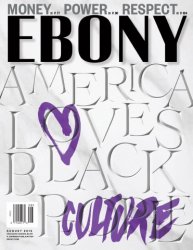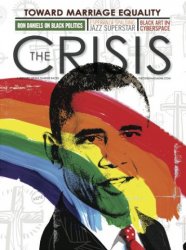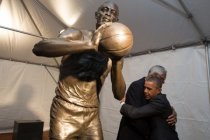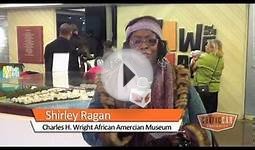Charles Wright African American Museum
 November 1, 1945 John H. Johnson published the first issue of Ebony magazine. The monthly magazine has published continuously since then with a current total circulation of more than 1.2 million. Ebony has always striven to address African American issues, personalities, and interests in a positive and self-affirming manner.
November 1, 1945 John H. Johnson published the first issue of Ebony magazine. The monthly magazine has published continuously since then with a current total circulation of more than 1.2 million. Ebony has always striven to address African American issues, personalities, and interests in a positive and self-affirming manner.
Caroline Still Wiley Anderson, educator and physician, was born in Philadelphia, Pennsylvania. Anderson graduated from Oberlin College in 1868, the only Black woman in her class, and returned to Philadelphia to teach. She later taught music, drawing, and elocution at Howard University. Anderson then decided to become a medical doctor and graduated from the Women's Medical College of Pennsylvania in 1878, the state's first Black female doctor. In addition to her private practice, Anderson ran the Berean Dispensary and the Berean Cottage which served poor women and children. She also helped found the Berean Manual Training and Industrial School and acted as assistant principal and taught elocution, physiology, and hygiene. Anderson helped to establish Philadelphia's first Black Young Women's Christian Association in the early 1900s. She was also treasurer for the Women's Medical College Alumnae Association, president of the Berean Women's Christian Temperance Union, and on the board of the Home for Aged and Infirm Colored People of Philadelphia. Anderson died June 1, 1919.
Anderson died June 1, 1919.
November 1, 1869 The 24th Infantry Regiment (the deuce four), an all-Black United States military unit, was organized. The unit was deployed to Cuba in 1898 as part of the U. S. Expeditionary Force in the Spanish-American War, deployed to the Philippine Islands in 1899 to help suppress a guerilla movement in the Philippine-American War, and guarded the U. S. – Mexican border in 1916 to keep the Mexican Revolution from spilling on to U. S. soil. Approximately 150 soldiers from the unit marched on Houston, Texas August 23, 1917 to protest racial discrimination in the city. They were met by local policemen and armed residents. In the ensuing riot, 4 soldiers and 15 civilians were killed. The soldiers were tried at court-martial and 14 were executed and 41 were given life sentences. This event is chronicled in "A Night of Violence: The Houston Riot of 1917" (1976). The 24th Infantry fought in the South Pacific Theater during World War II and occupied Okinawa, Japan from the end of the war until 1947. The 24th deployed to Korea in June, 1950 and fought throughout the Korean peninsula. The regiment received the Republic of Korea Presidential Unit Citation for their actions and two members of the regiment, Cornelius H. Charleton and William Thompson, posthumously received Congressional Medals of Honor for their actions in Korea. The experience of the 24th in Korea is told in "Black Soldier, White Army: The 24th Infantry Regiment in Korea" (1997). The 24th Infantry was deactivated October 1, 1951.
In the ensuing riot, 4 soldiers and 15 civilians were killed. The soldiers were tried at court-martial and 14 were executed and 41 were given life sentences. This event is chronicled in "A Night of Violence: The Houston Riot of 1917" (1976). The 24th Infantry fought in the South Pacific Theater during World War II and occupied Okinawa, Japan from the end of the war until 1947. The 24th deployed to Korea in June, 1950 and fought throughout the Korean peninsula. The regiment received the Republic of Korea Presidential Unit Citation for their actions and two members of the regiment, Cornelius H. Charleton and William Thompson, posthumously received Congressional Medals of Honor for their actions in Korea. The experience of the 24th in Korea is told in "Black Soldier, White Army: The 24th Infantry Regiment in Korea" (1997). The 24th Infantry was deactivated October 1, 1951.
You might also like






